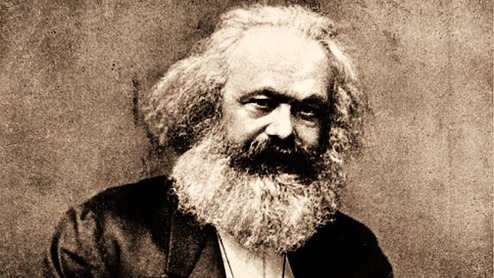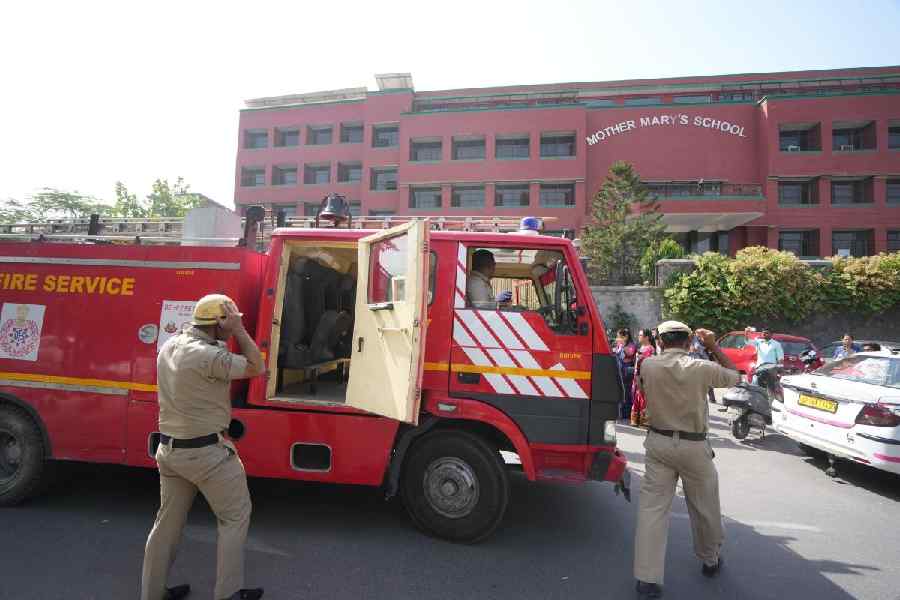The play’s title, Karl Marx In Kalbadevi, is intriguing. The father of socialism in an old mercantile hub in Mumbai, run by sharp, profit-oriented Gujarati traders? What will be the revolutionary writer’s opinion of this flourishing community? Will he be fascinated by their homegrown style of doing business, so unlike that of the fat cats of his time in England? Or will he run them down with his wellworn, anti-capitalist arguments?
Directed by Manoj Shah and written by the late Uttam Gada who was inspired by Howard Zinn’s Marx In Soho, the oft-performed play was staged again at Prithvi Theatre, Mumbai. Marx, played by Satchit Puranik in a 90-minute solo act, is on a visit to Mumbai 140 years after his death. Why of all places, did the co-writer of The Communist Manifesto want to come to Mumbai? To visit Mani Bhavan from where another revolutionary, M.K. Gandhi, launched the movement to free India from British rule. Describing him as a “perverted Communist”, Marx is clearly fascinated by the way the loincloth-clad “fakir” threw guilt at his opponents.
His other reason is to clear his own name that has been tarnished by countries like Russia, China, etc., who have used words like communism, socialism and Marxism to serve their own ends. “If there is one thing that I am certain of, it is that I am NOT a Marxist!” he pronounces vehemently.
Mani Bhavan, however, has shut for the day when Marx arrives and, by some quirk of destiny, he is whisked away to Kalbadevi by a dyed-in-the-wool Gujarati, Manoj Shah. A perfect setting for a lively, heated interaction between the founder of Marxism and enterprising Gujarati traders who can demolish communism with the same vigour as Marx demolished capitalism.
But that doesn’t happen. Marx goes around the bustling streets of Kalbadevi like any Western tourist, contrasting the inherent prosperity of the district with the beggars lining its streets, and repeating his 140-year-old theories.
“My object in life is to dethrone God and destroy capitalism,” continues to be his solution to class disparities when he sees the super-rich patrons of Mumbadevi temple jostle to seek the blessings of its goddess. His self-appointed guide, Shah, pushes him to the front to get anointed by the priest with a tilak that is dabbed on, off-centre. “It is left-leaning,” he is told, straight-faced.
Shah takes him to a popular eating joint, too, where Gujarati thali (unlimited quantity of food) is served, and overeating is quite the norm. Predictably, the writerphilosopher is shocked at how much food is served to each thalipaying customer and stricken by the contrasting, starved faces of a woman with her three children stationed outside.
Juxtapositions like these, however stark, are, of course, common subjects for satire, even if you are not as intellectual a writer as Karl Marx. From him one expected more, especially with the hindsight of 140 years.
Having said that, if you put aside such expectations, and settled down to getting an insight into the life of Karl Marx by Karl Marx, the play had its moments. Talking about his youth, he recounts how he had been shocked by workers of a mansion in Prussia being punished for burning the dried leaves of its garden to keep themselves warm; and had written an article on “the obscene acquisition of wealth by a few”, with a plea for the mansion owners to be arrested. This had the authorities baying for his blood, while kinder folks attributed his audacity to piles!
Thereafter, to avoid being thrown into prison, he chose the “bourgeois way out” by marrying Jenny, his long-time friend, and escaping to Paris. Here, another one of his profound one-liners took shape: “Social reforms are never carried out by the weakness of the strong; but always by the strength of the weak.” The French cops smell an “anti-national” and ask him to leave. House-bound in Brussels where the Marxs move, Marx and his friend Frederick Engels write the earth-shaking The Communist Manifesto.
Stirring up dissent wherever he went, Marx had to move house often, with Jenny and their children. Finally, they settled down in London where the philosopher-historian threw himself into deeper research and prolific writing, with more than a little help from Jenny. Karl’s handwriting being an illegible scrawl, it was Jenny’s meticulous rewriting and editing that was sent to the publishers, of newspapers and gigantic tomes like Das Kapital.
Never a practical man when it came to managing his domestic finances, Marx saw three of his children die due to dire poverty. “We had to crowdfund for my son’s coffin,” he relates in a moving episode in the play which ends with his stirring speech: “Workers of the world, unite. You have nothing to lose but your chains.”
Packing a life as eventful as Marx’s into 90 minutes was a tour de force by actor Puranik. However, insertions of snide comments about current events in India distracted from the main subject, even as they created laughter.
Three viewers, however, did not find the comments funny. Livid at Gandhi being drawn in (“Marx died when Gandhi was only 14”), they refused to accept creative liberty as justification for the comments on Gandhi, and India. “Do not bring activism into art,” hollered one of them. “Very bad, very bad,” shouted another.
The evening thus ended with food for further thought. How about a sequel, Karl Marx in Kolkata, where the never-ending debate on an artiste’s role in society can be woven in?










